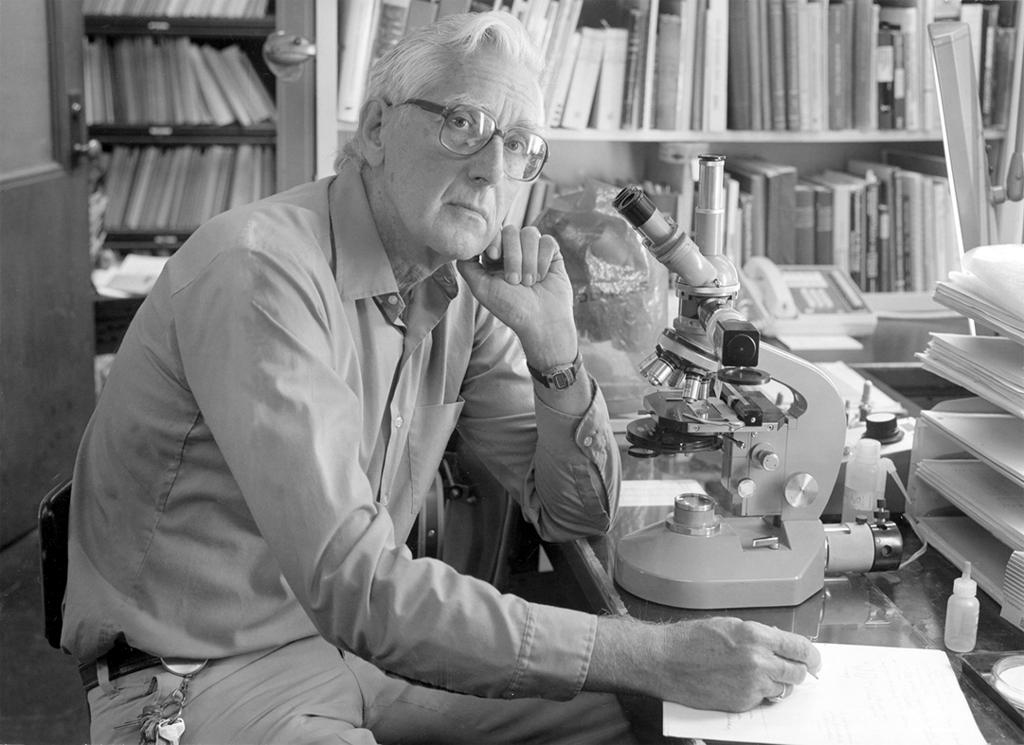Renowned mycologist Richard Korf dies at 91
By Krishna Ramanujan

Noted plant pathologist, scholar and mentor Richard P. Korf ’46, Ph.D. ’50, professor emeritus of mycology, died Aug. 20 at his Ithaca home. He was 91 years old.
Korf had a major impact in the field of mycology, where he specialized in a group of fungi called discomycetes, or cup fungi, which include morel and truffle mushrooms and other cup-shaped fungi. He described or reclassified many hundreds of fungal species.
“He was a world leader in the understanding and taxonomy of discomycetes; there are now three genera and at least 16 species of fungi named after him, including the locally common false morel, Gyromitra korfii,” said Kathie Hodge, associate professor of mycology in the Plant Pathology and Plant-Microbe Biology Section of the School of Integrative Plant Science.
Another area where Korf had a significant impact was in how fungi are named. He fought for rule changes to make assigning names to species more logical and practical, Hodge said. As an authority in the field, many colleagues relied on his advice on naming newly discovered fungi, she said.
Richard P. Korf Memorial
A memorial for Richard Korf will be held Sunday, Dec. 18, 2-4 p.m. at Barnes Hall Auditorium. Family and friends will speak in celebration of his life. Refreshments to follow. Donations in his honor can be made to Cornell's Richard P. Korf Graduate Student Excellence Fund.
Korf co-founded the journal Mycotaxon in 1974 with a friend, Gregoire Hennebert. The journal promotes rapid publication of discoveries in fungal biodiversity by allowing authors to format papers and assign reviewers themselves.
At Cornell, Korf directed Cornell University’s Plant Pathology Herbarium, the fifth-largest herbarium of fungi in North America. Korf’s contributions include specimens from expeditions to Japan, Bermuda, Macaronesia and Southeast Asia, plus local New York fungi. His personal collection comprises 5,000 specimens of fungi, including 257 types – each the first of its kind to be named.
Along with publishing more than 400 papers on cup fungi and fungal nomenclature, Korf trained and advised 27 graduate students and eight postdoctoral researchers.
“Richard Korf mentored many of the prominent fungal taxonomists in the world today,” said Gary Bergstrom, chair of the Plant Pathology and Plant-Microbe Biology Section.
“He had a great store of knowledge and used it generously and gracefully,” Hodge said. “The pride he took in his many students was a real gift to receive.”
Hailing from Westchester County, New York, and New Fairfield, Connecticut, Korf received his bachelor’s degree in botany in 1946 and his doctorate in plant pathology and mycology in 1950. He joined Cornell’s faculty in 1951 in the Department of Plant Pathology; he retired in 1992. During his career, Korf traveled and taught in Japan, Canada, Denmark and China, among other places.
Korf was also an active thespian and served as chair of Cornell’s Department of Theater Arts 1985-86.
His many honors and awards include an Ainsworth Medal for extraordinary service to international mycology from the International Mycological Congress (2010); selection as a British Mycological Society Centenary Fellow (1996); a Gamma Sigma Delta Cornell Chapter 1992 Distinguished Teaching Award (1993); a State University of New York Chancellor’s Award for Excellence in Teaching (1992); and a Distinguished Mycologist Award from the Mycological Society of America (1991).
Korf is survived by his wife, Kumi, and four children.
A memorial service for Korf is being planned for later this year.
Media Contact
Get Cornell news delivered right to your inbox.
Subscribe